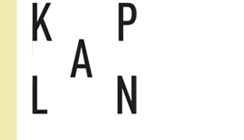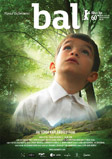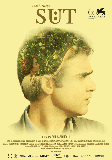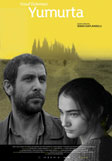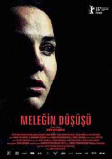PRESS
March 2010
End of a Trilogy, Beginning of Life: Honey (interview with S.Kaplanoglu)
Jülide Karahan -Skylife
END OF A TRILOGY, BEGINNING OF LIFE: HONEY
'Bal' (Honey), the last film of Semih Kaplanoğlu's 'Yusuf trilogy', took the Golden Bear at the Berlin Film Festival.
Semih Kaplanoğlu's 'Bal' (Honey) was one of 20 films competing for the Golden Bear at last month's 60th Berlin Film Festival. I met Kaplanoğlu at his office in Teşvikiye just days before the festival. The technical work was done, a copy had been printed and, in the director's own words, 'it was ripe'.
Are you satisfied with it?
It went well. Honey is a film in which I had access to ideal conditions, both in the shooting and in the post-production phase. We expended the most effort and energy on 'Honey' of all the films in the trilogy. This was my third film with Artistic Director Nazlı Erayda, and for the first time Naz really understood what I wanted to do. A perfect mesh of dream and reality, which was exactly what I wanted...
Are we going to see the world through the eyes of a six-year-old in the film, or are we going to look at that child as adults?
'Honey' is a film in which dreams have a share. A child's perception of the world is fed not only by objective sensations but also by dreams. We usually find childish emotions in films with a child in the lead role, but in this film the situation is different. The dreams also tell us something. Dream, reality, childhood, pristine nature, life in that nature, struggle... They all come together in harmony in the film, and this reinforces the film's emotional intensity. At the same time, 'Honey' touches on the Biblical story of Joseph and his father Jacob. When it is considered in conjunction with 'Egg' and 'Milk', the first two films in the trilogy, something else emerges. But the connections are not sharp and clear. We can't say that the connection between our childhood and the way we remember it today is apparent on the face of it. A person's discovery of himself is not clear and observable.
What could we say about your discovery of yourself?
What can I say? A person's discovery of himself begins with the realization that his self is useless. The way to discovering one's nature lies through understanding, learning and experiencing that one is not in the world without a reason, and believing that. Believing that, reminding oneself of it, understanding it and contemplating it. Most importantly of all, pondering it intellectually. In the end, the whole point of the effort is to love. To demonstrate love for and devotion to Him, and to make others feel His existence as well.
Did anything in particular inspire or influence you? Any particular incident, or film, or book, or words such that you might say, if that hadn't come my way, my films would never been the way they are, indeed, they might not have been at all?
In 1985 or '86, I watched Andrei Tarkovsky's 'Mirror' on a small beta-max cassette. I was young, I had studied film and watched a lot of films, but the impact of 'Mirror' and the feeling it gave me was what impelled me to actively realize my intention to make films. I saw in that film that cinema is actually another genre of art, a completely spiritual thing.
After your first film, 'Away From Home', we are confronted with a gradually simpler cinematic language in your films. Do you get a better understanding of what you want to do as you do it?
In fact, the primary source is poetry. You know, the way you posed your question a little earlier, as to whether a particular book or film influenced me. It was poetry that opened the door for me. A finished poem is perfect; even one extra comma would be superfluous. There is a harmony forged of words in poetry, and those words are actually anti-language because language means talking, in other words, the thing that separates us from ourselves and others. It is important to overcome the limits imposed by language. Painting liberates us from the confines of language. Poetry and the cinema do too. One three-line poem is worth pages of prose. In my relationship with the cinema, simplification is the single most important discipline I learned from poetry.
Could we say that leaving words behind leads our thoughts to the heart?
That is one phpect of simplification. The important thing is cinema itself, its wholeness and its accessibility to the human heart and soul, not just the eyes and ears. We will never actually see anything with our eyes as long as we cannot also see with our heart. Art is concerned with the heart. Therefore it has to be weighed on an extremely delicate scale. The story, the script, the image, the sound and all the other things must be in complete harmony. They must not come across as distinct entities. Only then will a feeling about the film emerge. There is a simplification in my films, a sense of going deeper and more intensely into the material. What I try to do is to find a correlative in film of our own civilization, our own culture, our own life experience, and to represent it in the spiritual dimension. When you do that, the film simplifies of itself.
It also slows down. Milan Kundera says in 'Slowness' that there is a mysterious connection between slowness and remembering and between speed and forgetting. “A person who is trying to remember something slows his pace. A person who is trying to forget some bad experience he had recently will speed up.” What is the slowness in your films trying to remind us of?
We are the only creature that perceives time. When you look at the question this way and consider that time is the raw material of film, you inevitably begin to distinguish between speed and slowness, fracturing and intensifying, prolonging and going deeper. Film today is very fast and tries to make us forget time. Speed means eliminating depth, nuance and detail and proceeding horizontally. Time is very important in our culture. There are the five times of prayer for one thing, and their significance. Art has to have a spiritual side, it has to elevate us, and open up our hearts and emotions.
When you were seeking a location for your film, you toured the Taurus, you looked at the area around Bolu, and in the end you went to Çamlıhemşin and found little Yusuf, in other words, Bora. If you had gotten there twenty days earlier you wouldn't have found him. What role do such if not coincidences then serendipities play in your life?
Serendipity, yes. I was looking for a pristine natural setting, a place where it was difficult even for a person to walk... I went to a lot of places. The area I wanted was around Artvin. I found it on the border with Georgia. But there were problems with permits and it didn't work out. Actually it's best not to force certain things too much. We were looking for a boy in Çamlıhemşin. I saw Bora on a bicycle as I was going by in a car. I stopped and got out and we talked. He was the son of a family that had migrated to Izmir some years back. The family had just returned to Çamlıhemşin twenty days earlier. In other words, if I had gone there twenty days earlier, I wouldn't have found him. What can I say? Bora is a very sensitive boy. He was the perfect complement to the other Yusuf's in the trilogy. He felt it, he wanted it. I don't know how but something happened, and we did it. With patience... The shoot took eight weeks and the boy spent his entire summer vacation with us. He went up in the mountains, he came down from the mountains, he walked, he talked, he never complained. He deserves the most credit for making this film what it is.
The trilogy is finished. It was a long journey. What direction is Semih Kaplanoğlu cinema going to take now?
The Yusuf trilogy was a project that went on for five years without a break. I haven't decided anything yet about what comes after this, but I've got some ideas having to do with historical figures. Abdulhamid, for example, strikes me as a very interesting character. I'd like to do something about him. And something to do with the Süleymaniye [mosque]. The five times of prayer at Süleymaniye, for example. Meanwhile, 'The Spirit of Turkey' is still on the table. What I am going to do next is still a question mark for me, but how I'm going to do it is clear. We don't always make our own decisions. We shall see...
